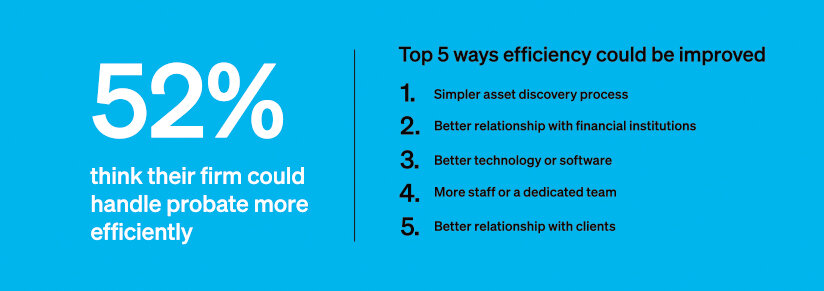
With the world becoming a more digitalised place and organisations having to adapt to remote working, it’s difficult to understand how a process surrounding something as inevitable as death is still so far behind in efficiency. From our recent research for our annual Bereavement Index, we unearthed further insights into the delays around probate.

1. Awaiting responses from other institutions
31% of the people we spoke to say this is the main cause of delay.
According to two thirds of legal professionals, at least 25% of probate cases are delayed, and the main cause is financial institutions. Most firms wait at least four weeks to get the information they need from asset and liability providers, with some responses taking up to 8 weeks.

2. Institutions slow to respond
We learned that in 80% of probate cases handled by legal professionals, at least 10 letters are sent, while 33% of cases require up to 50 letters. This is a huge volume of manual and paper-driven efforts. Not to mention that the response time to this will be much longer than if it were communicated digitally.
With such a large volume of paper-driven communication, it’s no wonder this is the second top reason that legal professionals say causes delays to the probate process.

3. Finding all the relevant assets
More than half (51%) of those who recently handled someone’s probate said it took longer than they expected, rising to two thirds where not all assets were known at the start.
Just 4% of people dealing with the bereavement process were confident they knew ‘a lot’ about the administration involved before they started, and shockingly, a third knew absolutely nothing. Furthermore, of those who were executor of the person’s estate (72%), as many as one in seven had no idea they had been made executor until the person died.
It’s no surprise that finding all the relevant information is one of the biggest challenges, when the executors quite often don’t know they have been chosen for the role.

4. General administration
Most probate work is still paper-based with 25 printed letters issued on every case. Our research found that for 62% of law firms, more than half of the work they do on a probate case to collect information on assets and liabilities is still manual.
Both consumers and legal firms agree that the probate process is not fit for purpose, and the administrative burden involved makes it a real challenge. And while most legal firms do think there are things that can be done to make improvements – primarily, improving communication with financial firms and better use of technology – 41% said they would consider a dedicated platform, and just 15% have actually done so.

5. Institutions unable to provide all information
A key part of administering an estate is gathering the assets of the deceased, but this can be problematic if the person died without putting their financial affairs in order. We discovered that 1 in 7 people had hidden assets and 37% of accounts are only discovered during the probate process.
Because of this, legal professionals rely heavily on the responses from financial institutions, which as we’ve learned, can be slow and incomplete. 20-30% of assets are unknown, therefore there is a risk that some are left undiscovered during the probate process. It is estimated that in 2019 alone, there was £130 billion in unclaimed funds from banks.
Law firms feel that if asset discovery were simpler, and they were able to get better access to their client’s financial data – rather than relying on the family, executor and financial institutions – they would be able to manage probate better than they currently do.

6. Drafting legal documents/dealing with the courts
The 6th top reason for delay in probate is probably the most tedious. Drafting legal documents and dealing with the courts, involves keying and rekeying repetitive data into forms. This is manual process and as previously highlighted, is the case with a lot of probate, it’s risk-prone due to human error and it’s extremely time consuming.
One of the features of the Exizent platform that is enormously helpful, is the Court Form Automation. This is the Scottish confirmation form (C1) and English probate forms (PA1A/PA1P) that apply for the right to access the funds in the deceased’s estate. The purpose of this feature is to ease the administrative strain for legal professionals undertaking an estate.
One of the major advantages of working closely with our customers is that we can be responsive to their needs and prioritise features that they believe are essential. Recently, we re-prioritised development to focus on Inheritance Tax forms (IHT400 and IHT205) which calculate and provide evidence for inheritance tax to be paid (before confirmation/probate). This reduces the manual, mistake-prone and time-consuming nature of form population for the courts.
So what can be done?

The legal professionals we spoke with highlighted some key areas in which they believe probate could be handled better. Luckily, a lot of these areas are where Exizent’s focus has been, currently is and will be in the immediate future.
Exizent are here to improve the bereavement process for all involved. We have already achieved ‘Better technology or software’ and have recently delivered Estate discovery to help legal professionals with the probate process. All of these will provide better relationships with clients and an overall efficient process for legal services and financial institutions.
Get in touch today to see our platform in action and how it could help your firm handle probate more efficiently.




